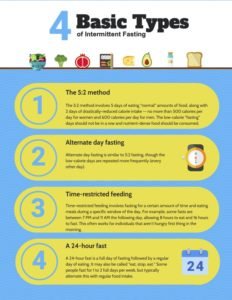Trends in Weight Control: Intermittent Fasting
Weight control remains one of the top New Year’s goals for many adults in the US. With over 71% of adults being overweight or obese, weight control should be front and center. Being overweight or obese raises the risk for cancer, cardiovascular disease, diabetes and other chronic illnesses.Lasting weight management involves sustainable habits to avoid the “diet, cheat, repent, repeat” cycle. If losing weight and keeping it off were easy, people wouldn’t spend 60 billion annually on weight loss products and programs.This month we’ll review various methods of weight control, starting with intermittent fasting.So, what is intermittent fasting?Intermittent fasting is a method of weight loss that was popularized by British doctor Michael Mosley. Mosley’s premise is that fasting lowers insulin levels and fat storage. With calorie deprivation, the body is forced to use stored fat for energy, resulting in weight loss.Mosley’s diet was followed by Kate Harrison’s book, The 5:2 Diet Book, which is based on her own experience. This was then followed by Dr. Jason Fung’s The Obesity Code.There are 4 typical methods for intermittent fasting.The 5:2 method involves 5 days of eating “normal” amounts of food, along with 2 days of drastically-reduced calorie intake. How far reduced? 500 calories per day for women and 600 calories per day for men. The low-calorie “fasting” days should not be in a row and nutrient-dense food should be consumed, such as lean protein and vegetables.Alternate day fasting is similar to 5:2 fasting, though the low-calorie days are repeated more frequently (every other day).Time-restricted feeding involves fasting for a certain amount of time and eating meals during a specific window of the day. For example, some fasts are between 7 PM and 11 AM the following day, allowing 8 hours to eat and 16 hours to fast. This often works for individuals that aren’t hungry first thing in the morning. Diet composition is less important with this approach.A 24-hour fast is a full day of fasting followed by a regular day of eating. It may also be called “eat, stop, eat.” Some people fast for 1 to 2 full days per week, but typically alternate this with regular food intake.Does intermittent fasting help with weight management?Yes, though it's not necessarily better than traditional weight loss methods. A systematic review of 41 articles describing 77 studies evaluating weight loss in overweight and obese patients discovered weight loss of .8% to 13% of baseline weight without significant adverse outcomes. Twelve studies comparing intermittent fasting to traditional calorie restriction found equivalent results. In 5 of the studies which including patients with type 2 diabetes, blood sugar control was improved.A recent review of randomized trials lasting >= 8 weeks in adults with overweight or obesity compared intermittent fasting and intermittent energy restriction with continuous energy restriction. The main outcome was weight loss. When compared to continuous calorie restriction, 9 out of 11 studies showed no difference between the groups in terms of weight or body fat loss.Are there other benefits to intermittent fasting?Intermittent fasting has benefits beyond weight reduction. A recent review of clinical studies shows benefits of intermittent fasting for epilepsy, Alzheimer’s disease, and multiple sclerosis (MS). Data from animal studies also indicates that intermittent fasting may help with Parkinson’s disease, ischemic stroke, autism spectrum disorder, and mood and anxiety disorders. Future studies should investigate if these positive effects are still seen regardless of patient age or obesity status.Differences in fasting patterns, calorie intake, and consumption of specific nutrients may also impact the success of intermittent fasting. Longitudinal research and randomized controlled trials may aid in predicting long-term effects of intermittent fasting on brain health. More research and longer trials with various methods of fasting are needed.Is intermittent fasting right for you?Overall, intermittent fasting is safe for most overweight or obese individuals.It is not advised for pregnant women or persons experiencing eating disorders. Even people who are only at risk of developing an eating disorder should not intermittently fast. Finally, intermittent fasting is not advised for individuals taking insulin due to risk of hypoglycemia.If you’re considering fasting, do the following:
- Ask your doctor about its safety and appropriateness based on your medical history.
- Work with a registered dietitian to help plan nutrient-dense meals.
- Drink plenty of water to stay hydrated. Aim for 16 ounces of water per meal with 8-12 ounces between meals.
- Limit physical activity on the days your calorie intake is greatly reduced.
- Start with not eating after dinner.
- Pay attention to how you feel. Is this plan right for you?
By Lisa Andrews, MEd, RD, LDReferences:
- FastStats - Overweight Prevalence (cdc.gov)
- Welton S, Minty R, O'Driscoll T, Willms H, Poirier D, Madden S, Kelly L. Intermittent fasting and weight loss: Systematic review. Can Fam Physician. 2020 Feb;66(2):117-125.
- Rynders CA, Thomas EA, Zaman A, Pan Z, Catenacci VA, Melanson EL. Effectiveness of Intermittent Fasting and Time-Restricted Feeding Compared to Continuous Energy Restriction for Weight Loss. Nutrients. 2019 Oct 14;11(10):2442.
- Gudden J, Arias Vasquez A, Bloemendaal M. The Effects of Intermittent Fasting on Brain and Cognitive Function. Nutrients. 2021 Sep 10;13(9):3166.
PDF Handout: Intermittent Fasting


